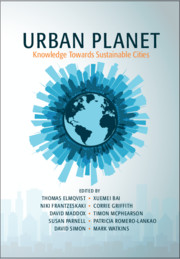Cities may not be viable places to live if people are threatened by lack of space and the accumulation of harmful or uncomfortable factors, such as traffic jams, pollution, and crime. This is a negative reality of urbanization, especially in developing countries such as Indonesia, because the fundamental infrastructure namely mass transportation and wastewater systems, for example, are still being constructed. Most jobs require people to be in the office, factory, or shop, requiring them to live in urban areas near their workplace. Improving the infrastructure that city residents use will be the mainstream approach to improving urbanization, as such improvements directly remove the obstacles to living comfortably.
If a job does not require one to be in these conventional workplaces, the worker no longer needs to live in the city. As such, their approach to work and a comfortable life can be different. These people are so-called knowledge workers, and I am one of them. My work involves telecommuting to a company based in an urban area; however, my company could, however be based in a rural area, too.
I live in a rural area of Bali called Canggu and run a think- & do-tank, su-re.co. Although urbanization is increasing here, the negative aspects mentioned above are largely absent. Our staff spends less than 10 minutes commuting to an island-style office without air conditioners; we can go to a beach after work for surfing at sunset. The only major downside is the difficulty of networking, and I still must travel on occasion, but most of my work, such as meetings, research, ordering goods, and outsourcing services, can be done online.
The term “knowledge worker” was first introduced by Peter Drucker in his 1959 book, Landmarks of Tomorrow (Drucker Reference Drucker1996). He described them, for example, as programmers, system analysts, technical writers, academic professionals, and researchers. The list can be expanded to some lawyers and schoolteachers, if their physical contact is not required. These knowledge workers develop or use knowledge that is transferred by information infrastructure, such as telephone lines and the Internet, from anywhere in the world.
Knowledge work was once only possible in advanced countries, but now there are opportunities to pursue such a lifestyle in developing countries, as well. In Bali, I have friends from across the globe and from multiple fields who have set up global businesses and start-up projects. In comparison with hard fundamental infrastructure, information infrastructure has improved and spread quickly. While I do not have access to public transportation in my area (save for Uber and Uber-like motorbike services) and there is not a sewage system, I have access to fiber optics and 4G mobile Internet.
There is macroeconomic evidence for an expansion in knowledge work in Indonesia. The Asian Development Bank’s 2013 report, Innovative Asia, shows general low scores on knowledge economy in this country, but the situation is getting better. In the 1960s, the Indonesian economy was largely driven by agriculture. However, by the end of the last century, agriculture’s contribution was less than 20 percent of the national GDP. Globalization and the Internet has accelerated knowledge work not only in Indonesia, but elsewhere as well. China is producing manufactured goods, but it is also selling added value in knowledge, namely through design and marketing. India works not only as the world’s call center, but also as a Silicon Valley of sorts, with a bit more humidity and chaos. Why shouldn’t Bali also have the same industries in a much nicer environment? In a 2007 World Bank Institute report, Building Knowledge Economies, Indonesia was already listed as one of the 18 most successful developing countries moving towards a knowledge economy.
Moreover, as David Kreps predicted in Corporate Culture and Economic Theory (Reference Kreps1990), it does not matter where we work as long as a brand image and reputation are controlled by knowledge infrastructure. Before individual service providers were rated through sites such as on AirBnB or Uber, academic researchers were rated based on their knowledge, and their reputation was shared across the globe. The significance of research is determined largely by the number of times it is cited by others, and approval or criticism of its research result. These functions are the same as the “like” and “share” buttons or “comment” function on Facebook. Many other knowledge-based positions will rely on similar metrics in the future. There is already a social network service site for specialized computer graphic designers, behance.net. In the future, it will not matter if we sit in the middle of a traffic jam in Jakarta or on a surfboard in Bali before or after work. Instead, we will be judged by the quality of our knowledge products, not where those products came from.
Conventional, hard, fundamental infrastructure supports life in the city, while information infrastructure can help support lifestyles outside of urban areas. Both approaches will create more livable lifestyles – traffic-free commuting by good public transportation, or telecommuting. Hard fundamental infrastructure supports are necessary, as more than half of the global population has been living in urban areas since the end of 2008. However, it is becoming important to develop information infrastructure in developing and advanced countries, as hard infrastructure development may not catch up to the speed of urbanization. Let knowledge workers have the choice to stay in rural areas, which can mitigate urbanization by slowing its velocity.

